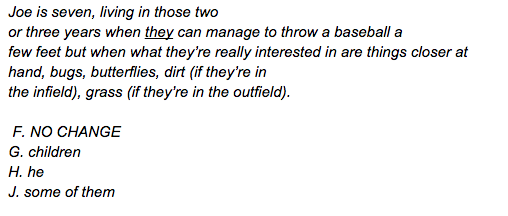
Are you wondering about the difference between the ACT English and SAT Writing sections? Do you want to know how the two sections are similar? Are you trying to figure out which section would be better for you? (Or maybe you just love reading my guides?)
In this article, we will compare and contrast the ACT English and SAT Writing sections. We'll compare their formats and content. Reading this post can inform your studying and help you decide whether the ACT or SAT would be a better match for you and your abilities.
For a more thorough breakdown of each individual section, check out the articles about what's actually tested on ACT English and SAT Writing.
Essay?
ACT English=No Essay
You do not have to write an essay for the ACT English section. However, there is an essay that comes in the last section of the ACT Plus Writing test. This essay score is NOT included in the calculation for your composite score.
You can choose whether to register for the ACT (no essay) or the ACT Plus Writing. Keep in mind that some colleges require you to take the ACT Plus Writing.
SAT Writing=Essay
You do have to write an essay for SAT Writing. The essay will always be the first section of the SAT, and it accounts for roughly 30% of your overall SAT Writing score. The SAT Writing essay is a 25 minute persuasive essay. Even though many schools don't require SAT Writing, you have no choice in whether to take the essay or not.
For more information about the SAT essay, learn about the different types of essay prompts and how to train the SAT essay.
Multiple Choice Formats
ACT English
There is one section. You have 45 minutes to answer 75 questions. This amounts to just 36 seconds per question!
SAT Writing
There are two multiple choice sections. There is one 25 minute section with 35 questions and one 10 minute section with 14 questions, for a total of 49 questions. This amounts to 43 seconds per question.
You may have to take an additional writing section, but then one of the writing sections will be experimental and won't have an effect on your score. Make sure to put in maximum effort on all sections because you won't know which section is the experimental one.
 So you're saying there's a chance!!!
So you're saying there's a chance!!!
Types of Multiple Choice Questions
ACT English
In the one ACT English section, there are five passages, each of which is accompanied by multiple choice questions. Even though each passage has many questions associated with it, most questions are independent of one another and test different grammar skills.
Here's what the questions look like. Most questions correspond to a numbered portion underlined in the passage. Some of these questions are explicitly asked and some expect you to find the best change for the underlined portion of the passage. Also, there are questions that correspond to a numeral in a box in the passage. Here is an example of each type of question:

SAT Writing
There are three types of questions on the SAT Writing. Each question type is grouped together and the order is always the same.
Improving Sentences
Improving Sentences is the first question type. There are 25 total sentence improvement questions. In these questions, a portion of a sentence will be underlined and you have to decide which answer choice is the best improvement of the underlined portion. Answer choice A will be identical to the original. Here is an example:

Identifying Sentence Errors
The next question type is identifying sentence errors. These questions always follow sentence improvement on the 25 minute writing section, the only section in which you can find them. There are 18 total identify the error questions. In these questions, you have to choose which portion of the sentence is incorrect. Answer choice E will always be "No error".
 In case you were wondering, the answer is B.
In case you were wondering, the answer is B.
Paragraph Improvement
The last question type is paragraph improvement. The paragraph improvement questions are always the last questions on the 25 minute writing section, the only section in which you can find them. There are 6 total paragraph improvement questions. In paragraph improvement, there are questions pertaining to improving individual sentences within a passage and questions about improving the passage as a whole.

Key Similarities in Multiple Choice Content
Even though the ACT English and SAT Writing sections look very different, they're more similar than not in terms of what they test at their core.
You Need to Know Grammar!!!
Both ACT English and SAT Writing test your knowledge of grammar and specific grammatical rules. All three question types on SAT Writing have questions related to grammar. To review the specific grammar rules that are tested, check out these articles on grammar for the ACT and SAT.

Here are examples from the ACT English and SAT Writing sections that test proper pronoun usage:
ACT English

SAT Writing

Explanation: In the ACT example, "they" is an unclear pronoun. Every pronoun must have a clear antecedent. The correct answer is G. In the SAT example, B is incorrect because the pronoun refers to "workers". Because the antecedent is plural, you must use the plural pronoun "their" instead of the singular pronoun "his or her".
You can see how the same grammar rule is tested in both tests, even though the format is different. This is typically true across most of the grammar rules tested on both tests.
Writing Style Questions
Beyond grammar, ACT English and SAT Writing also have questions related to writing style. Often, these questions will test your ability to make a sentence more concise or less awkward. There are SAT Writing style questions on both the sentence improvement and paragraph improvement subsections. Here are examples of style questions from both ACT English and SAT Writing:
ACT English
 Explanation: Due to the word "maybe", "might possibly" is unnecessary and redundant. The correct answer is J.
Explanation: Due to the word "maybe", "might possibly" is unnecessary and redundant. The correct answer is J.
SAT Writing

Explanation: "That" is unnecesary. To make the sentence more concise and less awkward, the correct answer is C.
 Pleasure reading
Pleasure reading
Organization Questions
Both the SAT and ACT have questions related to sentence organization. Often, you will be asked where a sentence should be placed to most logically fit in a passage. In SAT Writing, the organization questions are in the paragraph improvement subsection. Here are examples of organization questions on ACT English and SAT Writing:
ACT English
SAT Writing
Key Differences in Multiple Choice Content
Despite these similarities, SAT Writing and ACT English are also different in clear ways. How you feel about each of the below can help predict which section you're likely to do better in.
The SAT Focuses More on a Few Specific Grammar Rules
The SAT Writing section tends to repeatedly test a limited number of grammatical rules. Perhaps the rule tested most often on SAT Writing is subject-verb agreement. Check out this question related to subject-verb agreement from an actual SAT:

Explanation: In this sentence, the subject is "Prime Minister", a singular noun. However, the verb "have argued" is plural. In order for the subject and verb to agree, "have argued" should be changed to "has argued". The answer is C.
In contrast, the ACT doesn't emphasize subject-verb agreement as much in its questions.
More ACT Questions Related to Vocabulary and Idioms
While the ACT does not test you on the hard vocabulary words that you find on the more difficult SAT sentence completion questions, there are ACT English questions that require you to know how to correctly use certain words.
Also, there are a number of ACT questions that test you on your knowledge of idioms. Idioms are phrases that don't correspond with a specific rule. Idiom questions can be difficult because you need to be familiar with the exact phrases that appear on the test. Questions related to word choice and idioms also appear on the SAT Writing section, but there are more of these questions on ACT English.
Here is an ACT English question that could test your vocabulary:

Explanation: Here, the answer is J. Peril means danger, making the word "dangerous" redundant and thus unnecessary. This question would be very difficult if you didn't know the meaning of the word "peril".
This is an example of an ACT English question about a prepositional idiom:
 Explanation: The correct phrase is "sat across from" so the answer is D. ACT English will test your knowledge of particular phrases and knowing which preposition to use in a given phrase.
Explanation: The correct phrase is "sat across from" so the answer is D. ACT English will test your knowledge of particular phrases and knowing which preposition to use in a given phrase.
The ACT Tests More On Punctuation
Roughly 10-15% of ACT English deals with punctuation. Rules regarding commas, apostrophes, semicolons, colons, parentheses and dashes can be tested on the ACT. Punctuation questions are rare on the SAT.
This is an ACT English punctuation question:

Explanation: The correct answer is A. The comma correctly separates an independent from a dependent clause. Answer choice B would create a sentence fragment. Answer choice C incorrectly uses a semicolon, which should separate two independent clauses. Answer choice D is a comma splice.
These types of questions are very common, which makes clear that the ACT believes understanding punctuation usage is important for mastery of writing.
Most of the questions related to punctuation on the SAT Writing have to do with run-on sentences. You should know the general rule that a semicolon can correctly separate two complete thoughts whereas a comma cannot.
 Who doesn't love punctuation?
Who doesn't love punctuation?
More ACT Questions Involve Reading Comprehension
ACT English has two types of questions that test your reading comprehension: strategy and organization questions. Strategy questions ask you to determine the effect of adding, deleting, or revising sentences from a passage. Other strategy questions ask you to judge the relevance of statements within the context a specific passage. Organization questions test how well you can organize ideas and sentences within a passage.
Here is an example of an ACT English strategy question:
 Explanation: In order to get this question right, you have to understand the purpose of the sentence given its placement within the passage. Here, the author is providing evidence showing that people can be friendly on the subway. The correct answer is H.
Explanation: In order to get this question right, you have to understand the purpose of the sentence given its placement within the passage. Here, the author is providing evidence showing that people can be friendly on the subway. The correct answer is H.
Paragraph improvement questions in SAT Writing also contain strategy and organization questions, but there are far fewer of these types of questions on the SAT.
The ACT English Sentence Is More Likely to be Correct
More ACT English questions have a correct "NO CHANGE" answer than SAT Writing questions have a correct "No error" answer. Generally, only about 10% of the SAT Writing identify the error questions can correctly be answered with "no error". Similarly, only about 10% of sentence improvement questions can correctly be answered by not changing the sentence at all (answer choice A).
Meanwhile, on the ACT English section, the correct answers tend to be distributed roughly evenly between all answer choices. This can help influence your guessing strategy when you have no idea what the answer is.
Which Is Better For You?
The million dollar question is figuring out whether you'll do better in SAT Writing or ACT English. If you're having major problems with this section on either test, then it might be holding your composite score down. If you change to the other test and it's a better fit, you might be able to raise your composite score.
General Tips
Since SAT Writing relies more on knowledge of a few specific grammatical rules, those who are able to learn and understand those rules may prefer the SAT. We'll be covering more of the rules that appear more often on the SAT in an upcoming article.
In my opinion, possessing an intuitive grasp of English, meaning knowing what “sounds right” may be more beneficial for ACT English. The SAT Writing intentionally makes sentences sound awkward, even when they’re correct, just to test your knowledge of grammatical rules. If English is not your first language, you may prefer SAT Writing because it relies more on specific rules and less on an intuitive grasp of English.
If you’re particularly strong at reading comprehension, you may prefer ACT English because there are more questions which test your reading comprehension skills.
Practice Both and Compare Your Results
Instead of speculating or assuming, you can take a practice SAT Writing section and a practice ACT English section and compare your results. You may find that you score significantly higher percentile wise on one of them.
Keep in mind that this is only one section of each test, and that you will also need to weigh whether you're better at SAT Math vs ACT Math, and SAT Reading vs ACT Reading. Furthermore, the ACT has a Science section to consider.
 Be strict about evaluating your performance.
Be strict about evaluating your performance.
What's Next?
Are you still struggling to decide if you should take the SAT or ACT? Read this article to help you make the decision.
Also, find out how to improve your SAT Writing score. Better yet, learn how to get a perfect SAT Writing score.
Did you know that ACT Writing is changing? Learn about the new enhanced ACT Writing test.













